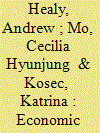| Srl | Item |
| 1 |
ID:
154906


|
|
|
|
|
| Summary/Abstract |
We consider the thesis of Alexis de Tocqueville (1856) that economic development and increased mobility may generate political discontent not present in more stagnant economies. For many citizens, as they become aware of the potential for improved living standards, their aspirations may increase faster than actual living standards. Expanded opportunity may then paradoxically result in dissatisfaction with government rather than greater confidence. We develop a formal model to capture Tocqueville’s (1856) verbal theory and test its predictions using a 2012–2013 face-to-face survey experiment conducted in Pakistan. The experiment utilizes established treatments to subtly manipulate either a participant’s perceptions of her own economic well-being, her perceptions of society-wide mobility, or both. As predicted by the theory, political discontent rises when declining personal well-being coincides with high mobility to create unrealized aspirations. The results thus identify the conditions under which expanded economic opportunity can lead to political unrest.
|
|
|
|
|
|
|
|
|
|
|
|
|
|
|
|
| 2 |
ID:
090820


|
|
|
|
|
| Publication |
2009.
|
| Summary/Abstract |
Do voters effectively hold elected officials accountable for policy decisions? Using data on natural disasters, government spending, and election returns, we show that voters reward the incumbent presidential party for delivering disaster relief spending, but not for investing in disaster preparedness spending. These inconsistencies distort the incentives of public officials, leading the government to underinvest in disaster preparedness, thereby causing substantial public welfare losses. We estimate that $1 spent on preparedness is worth about $15 in terms of the future damage it mitigates. By estimating both the determinants of policy decisions and the consequences of those policies, we provide more complete evidence about citizen competence and government accountability.
|
|
|
|
|
|
|
|
|
|
|
|
|
|
|
|